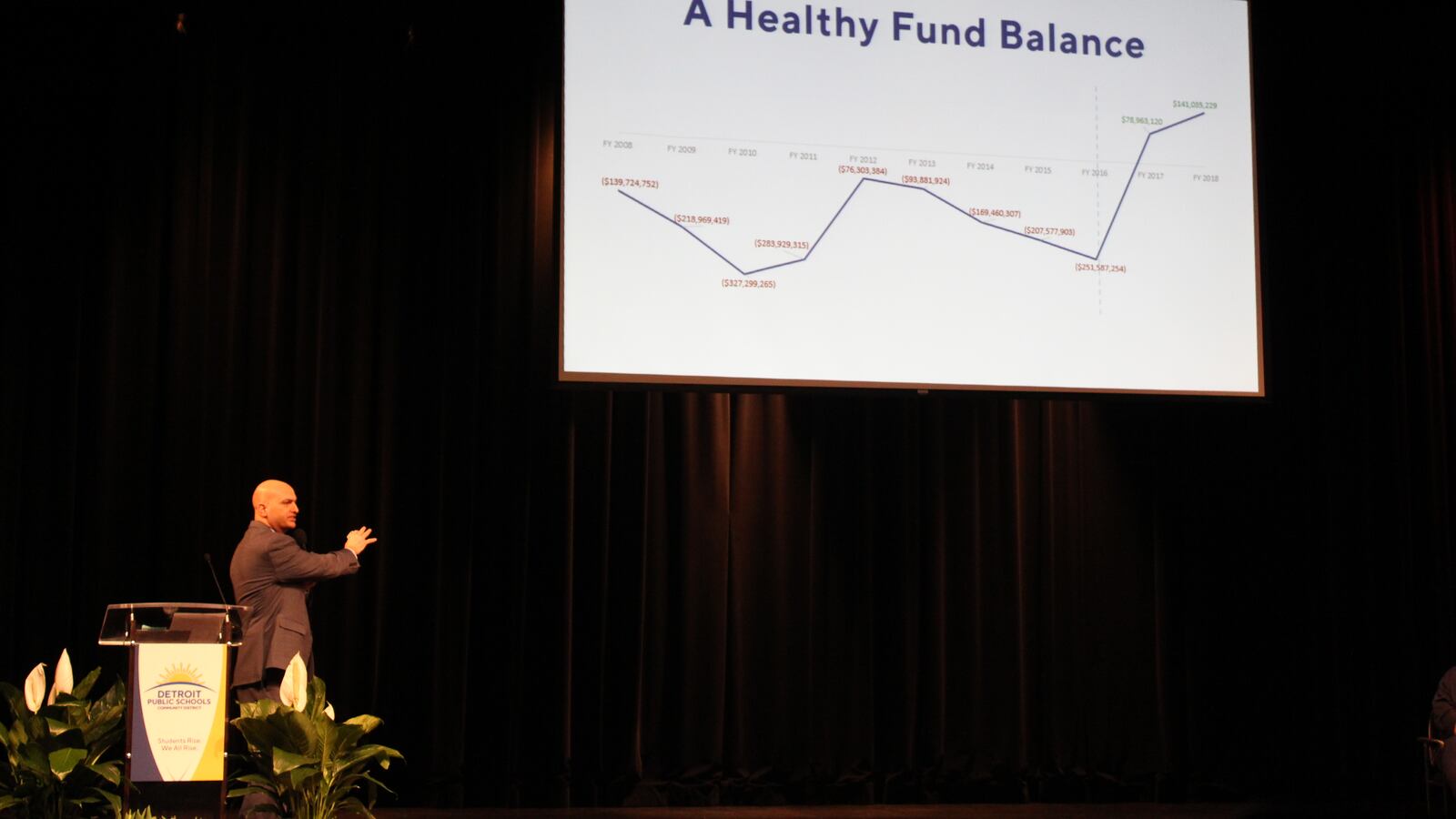The Detroit school district is close to shedding financial oversight after nearly two decades of state control and supervision.
The district has been under the oversight of the Detroit Financial Review Commission, which currently must review and OK the district’s budget, out-of-state travel, and union contracts, among many items.
Superintendent Nikolai Vitti says that could be over soon. At a community meeting last month, he said that in six months, oversight from the commission could end, and the district could regain its financial independence.
“We’ll have flexibility to do things differently,” Vitti said at that meeting.
The district has been under the oversight of the commission since 2016, when Michigan lawmakers OK’d a $617 million plan to address crushing debt in the city’s school district. That plan called for creating a new district — the Detroit Public Schools Community District — to educate students. The old district — Detroit Public Schools — continues to exist, but only to pay taxes and pay off debt.
Shedding that oversight isn’t as simple as maintaining a balanced budget, though. Per a December agreement with the commission, the district must meet several criteria before the commission will waive its oversight. Even if that does happen, the commission would still exist.
Among other things, the district must:
- Adopt a deficit-free budget for three consecutive years.
- Be eligible to issue municipal securities or debt obligations.
- Comply with state laws regarding local government budgeting.
- Make all payments to the state’s school employee retirement system.
- Publish all contracts on the district’s website.
Vitti said the district is already in compliance with the second, third and fourth items. The district will be in compliance with the fifth in a few weeks when it begins posting contracts online, he said.
The district has already had two consecutive years of balanced budgets and is on track for a third, he said.
“The audit in November will confirm if the district adhered to the budget and remained balanced,” Vitti said.
Vitti has long openly maintained that a locally elected and empowered board — along with an appointed superintendent — are best for the Detroit district. Emergency management in the district ended Dec. 31, 2016. An empowered board, elected in November 2016, took office in January of 2017. Vitti was hired that May.
During a State of the Schools event Wednesday night, he showed a chart that provided a history of how debt in the district soared during the years it was under the control of an emergency manager.
“Emergency management was a colossal failure,” Vitti said.
The commission would have to formally waive its oversight. That waiver could be rescinded if the district falls back into financial problems. And the commission would still exist, because state law requires it to remain in place until all debt is repaid. The district’s operating debt is expected to repaid by 2027.
Even as the district moves to shed state oversight, it’s still dealing with the impact of state control. Before 2016, the district had been under some form of state control for nearly 20 years. And one of the biggest issues facing the district is the poor condition of its buildings.
Last year, a facilities audit found the district has $500 million in needs right now — a number that could grow to $1.4 billion if the district does nothing. The district has begun to take on some needed projects, such as replacing roofs and boilers at some schools.
Chalkbeat Detroit asked Gov. Gretchen Whitmer, during a wide-ranging interview last week, if she thinks the district is ready to exit state oversight given its facility needs. Whitmer said the district is ready for independence.
“I think that the district’s got to be able to function and I think for a long, long time they’ve been operating not (being) able to make their own decisions and (being) undermined,” Whitmer said. “I think there’s leadership that is ready to take it to the next step.”
Whitmer said she’s talked to Vitti “quite a bit,” since she took office earlier this year.
“The best thing that we can do is get a budget passed that actually invests in the education of kids,” she said. “Then phase two is remedying our issues with regard to infrastructure and helping DPS make the investments in the facilities.”

